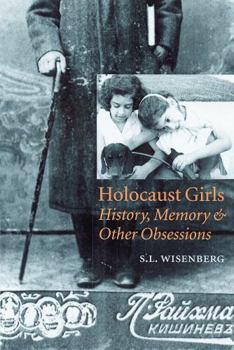Holocaust Girls: History, Memory, and Other Obsessions
Select Format
Select Condition 
Book Overview
This bracing and vivid collection of essays gives voice to what some American Jews feel but don't express about their uneasy state of mind. These essays creatively and sometimes audaciously address the question of what it means to be an American Jew trying to negotiate overlapping identities--woman, writer, and urban intellectual in search of a moral way. S.L. Wisenberg's deeply ambivalent connection with the Holocaust reappears throughout these essays as she struggles to find a way to live with history without being swallowed by it.
Format:Hardcover
Language:English
ISBN:0803248016
ISBN13:9780803248014
Release Date:September 2002
Publisher:University of Nebraska Press
Length:148 Pages
Weight:0.90 lbs.
Dimensions:0.7" x 6.0" x 9.0"
Customer Reviews
1 rating
intense, fascinating, worthwhile
Published by Thriftbooks.com User , 22 years ago
This fascinating book of personal essays by Chicago-based writer Sandi Wisenberg covers a wide range of subjects--Holocaust subjects such as Herschel Grynszpan, Hannah Senesh, Margot Frank (Anne's sister), and Kurt Waldheim, as well as the author's personal and family life, her Jewishness, visits to Paris, Mexico, and Central America, Yiddish classes, Franz Kafka, and race relations in Chicago. The book's title comes from her early years growing up in Texas in the 1960s when she and her sister used to hide in the closet and imagine the Nazis were coming to get them. "You immerse yourself in descriptions of horror," she writes about her childhood. "You stand in the library aisle in the World War II-Europe section and thumb through familiar pages. You stare at the photographs of the skeletons, compositions you've memorized. You watch your tears make little dents, like tiny upturned rose petals, on the pages." Early on Wisenberg became aware of her distant relatives who perished in Europe. "The ones left behind in Kishinev, in Slutsk, in a little shtetl near Kovno called Pusvatin: great-grandparents and great-great uncles, cousins three and four times removed."Wisenberg writes about her Second Generation friend in Skokie, Illinois, who reads to his ailing mother every day from Mila 18, the Leon Uris novel about the Jewish Ghetto Uprising. "His father was in Auschwitz and Bergen-Belsen, his mother was drifting through Poland on her own, twelve years old, and then surrendered herself at a work camp." With all of his grandparents dead and his parents speaking English with thick Yiddish accents that his classmates made fun of, he "felt like a stranger in this country, an outsider, outside the lives of other Jewish Americans." When Wisenberg tells him she feels the same way, he jokingly asks her, "Are you a victim without a Holocaust?"The author's obsessive connection to the Holocaust gives this book its most intense and compelling moments.Charles Patterson, Ph.D., author of ETERNAL TREBLINKA: Our Treatment of Animals and the Holocaust





